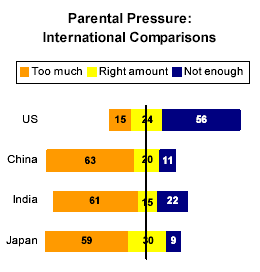
How Does its Education Affect the Roles of Japanese Internationally?
In-School and Out-of -School
Although Japan ranks average in the number of school hours compared to most industrialized countries, the hours spent on after school activities are vast. Many students stay afterschool to participate in extracurricular activities for hours. By the time they arrive home, it is often dark and dangerous outside. For these reasons, schools tend to supervise the lives of students outside of school as well. Schools hire guards and volunteer parents to patrol the streets as students head home. Parents tend to expect the schools to teach their children moral standards and hold responsibility on their psychological and physical safety as well.
Japanese Schools give quite a bit of homework and tests, inevitably causing the students to spend most of their time out of school studying for these tests and reviewing school work.
The Psychological Pressure on Students
Family and Peer Pressure
Extra-curricular activities tend to become a compulsory part of student life due to peer pressure. A psychological hierarchy of students within grades tend to form based on the afterschool clubs they join. Students in sport activities tend to get ranked higher, opposing to students in minor activities. After all the hard work in their clubs, many students go to cram schools called "Juku". Most families tend to feel that school education is not enough, and send their children to a Juku after school and on the weekends. Parents feeling competitive against other parents over their children's grades cause a great amount of psychological pressure on students. The scoring systems of the Japanese education create an abnormal amount of competition between students themselves as well.

